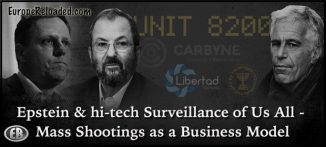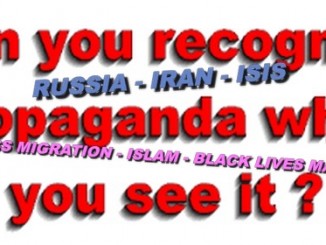
Trump Drops the Value of the EU as an Ally — to Zero
ALISTAIR CROOKE
Maybe we are misreading things. Not a small number of commentaries have suggested that President Trump intended for Helsinki to re-set the Kissinger-esque triangulation between the US, Russia and China. And there are good grounds for making such a hypothesis. At a 2015 press conference, Trump, himself, took the Kissinger line — that the US should always try to keep Russia and China divided, and never allied together against America):
“…One of the worst things that can happen to our country is when Russia ever gets driven to China. We have driven them together – with the big oil deals that are being made. We have driven them together. That’s a horrible thing for this country. We have made them friends because of incompetent leadership. I believe I would get along very nicely with Putin – okay? And, I mean [that] where we [the US] have the strength. I don’t think we need the sanctions. I think that we would get along very, very well.”
This makes a lot of sense, but maybe in Helsinki Trump was doing something a little less strategic and more down-to-earth – something more in line with his Art of the Deal philosophy.
We have, over the decades, developed a fairly precise mental model of how “Presidents are supposed to behave; and how the policymaking process is supposed to be carried out. Obviously, Trump does not fit their model”, Jim Rickards writes. “[GW] Bush and Obama were totally process-driven. You could see events coming a mile away as they wound their way through the West Wing and Capitol Hill deliberative processes.” With Trump, Rickards continues, “there is a process, but it does not adhere to a timeline or existing template. Trump seems to be the only process participant most of the time. No one else in Washington thinks this way. Washington insiders try to avoid confrontation, avoid escalation, compromise from the beginning, and finesse their way through any policy process.”
“Here’s the Trump process:
- Identify a big goal (tax cuts, balanced trade, the wall, etc.).
- Identify your leverage points versus anyone who stands in your way (elections, tariffs, jobs, etc.).
- Announce some extreme threat against your opponent that uses your leverage.
- If the opponent backs down, mitigate the threat, declare victory and go home with a win.
- If the opponent fires back, double down. If Trump declares tariffs on $50 billion of goods from China, and China shoots back with tariffs on $50 billion of goods from the U.S., Trump doubles down with tariffs on $100 billion of goods, etc. Trump will keep escalating until he wins.”
Eventually, the escalation process can lead to negotiations with at least the perception of a victory for Trump (North Korea) — even if the victory is more visual than real.
So, if we reframe the Helsinki meeting through this Art of the Deal lens, what do we get? Seeing that the divergencies of vision between Russia and the US are so substantial, and the common ground is so small, there is very little prospect for a ‘strategic global deal’. In fact, President Trump has little that he can offer Russia: sanctions relief is not in his gift (it is in the maw of Congress), and he could not – at this stage – relinquish Ukraine, even if Trump understands that the US and Europe bought a ‘pig in a poke’ with its Maidan coup in Kiev.
“So”, as Russian commentator Rostislav Ishchenko writes (in Russian, translation here): “We have a situation where both parties, even prior to negotiations, knew that they wouldn’t be able to come to some arrangement, and they didn’t even prepare for such a thing (it wasn’t planned to sign anything following the results of negotiations). At the same time, both parties needed the event to be successful”. Ishchenko continues: “Trump obviously blackmails the European Union with a possible agreement with Russia. But Putin also needs to show Europe that there are other fish in the sea besides them.”
“The position of Europe is clear. It isn’t a coincidence that Trump, while enumerating the enemies of the US (the EU, China, and Russia), made it clear that he considers Russia to be a smaller problem [than the EU], because there are practically no economic contradictions (“Nord Stream-2” doesn’t count) with it. It’s not China, with which the US has the biggest negative trade balance, but the EU, which Trump fairly defined as the main trade competitor, receiving unjustified economic benefits from political agreements with the US, and which is the main ‘foe’ of the US.
“[Thus Trump] resolves his military-political contradictions with Russia, [and consequently] reduces the value of the EU as an ally for Washington, to zero … Europe was accustomed to (and hoped to continue to use) its role of a springboard for the fight against Russia as [the primordial] argument that was supposed to keep Trump away from making the last step (complete separation with the EU).
In recent days, Merkel, after the NATO summit, started talking literally … [that Trump’s hostility towards Europe is unjustified], because Europe battles with Russia for the interests of the US.
“For the EU it was crucial that this argument continued to work. Otherwise, Washington indeed, would have more common ground with Moscow than with Brussels. And Europe isn’t ready for a sharp confrontation with the US. Having rested on its laurels [i.e. on its conviction that it occupied, as it were, some ‘moral high ground of values’]. Europe wasn’t engaged (in difference, for example, from China), in the diversification of economic ties and appeared to be strongly dependent on access to the American market.
“Without having risked to be ahead of Trump in the question of normalising relations with Russia, EU leaders were fatally afraid that Trump and Putin, despite all difficulties, will do the impossible and reach an agreement, especially as both proved to be people who are ready to instantly make decisions that change the destiny of the world.
“The position taken by the EU raised the value of the summit for Russia, too. Moscow can wait until Washington is ready for reconciliation. But, taking into account the obvious intention of Europe to manoeuvre between Russia and the US, trying to preserve the geopolitical configuration that is profitable for itself, but doesn’t suit either Trump nor Putin, Russia was also interested in showing to the whole world the success of the summit and good prospects for achieving definitive and comprehensive agreements.”
In short, Trump was using Helsinki to leverage “an extreme threat against your opponent” (Europe), by voiding the European ‘card’ of its ‘usefulness’ to America through its constant battling against Russia. Indeed, the recent NATO final comunique reads almost precisely as an legal indictment of Russia and its behavior.
Both Trump and Putin took a big political risk by staging this ‘end to Cold War – coup de théâtre’. Trump has unleashed extraordinary hysteria in parts of the US, provoking numerous Washington Post op-eds to language such as characterising Trump’s words (at the press conference) as ‘apostasy’ and ‘a cancer amongst us’. (Apostasy is the language used by violent jihadists against non-believers.)
The latent hatred for Russia is unmistakeably revealed. This animosity will not be a surprise to Putin – though the extremity of the elite language used towards Trump will make Russians aware of their risks – what might ensue were Trump somehow be removed from office?
What does such language portend? The roots of American Russo-phobia go deep. It starts with American Trotskyist activists’ on ground participation in the initial Trotskyist Bolshevik revolution – largely financed and orchestrated by Wall Street. Not only did New York bankers provide money, they also facilitated safe passage to Russia for revolutionaries such as Trotsky and others. Stalin’s ultimate killing of the Trotskyist killers in the 1930s (and many others) is at the root of the Russian ‘thuggery’ language still circulating in US (even if some have forgotten its origins). Stalin’s cleansing has never been forgiven by certain circles in the US.
Of course, what rankles most in America, and amongst European liberal elites, is the apparent according of moral equivalence of Putin to America, and to America’s intelligence capabilities. America believes it WON – it won the Cold War culturally, and in terms of its systems of government and economics. This ‘End to History’ hubris voided – in this ecstatic state – the need to treat Russia as other than a psychologically ‘defeated people’ (which they were not).
The western Establishment anger stems ultimately from Russia’s refusal to acquiesce to their merited ‘defeatism’ (in this view): Putin rejected to merge Russia into the American-led global order, preferring Russia to remain somehow ‘Russian’, in its own Russian cultural way.
What are the implications for Europe? For Europe this is a catastrophe. It means that US dialogue with Putin will continue. Where to run for the EU – to Washington or to Moscow? To remain loyal to an old suzerain or to try to adhere to a new one, before others get there first?
Moreover, unlike Russia, Europe can’t wait. By meeting Putin, Trump brought the US out of zugzwang, having handed over to the European Union the right to make this same move, which only risks complicating Euro politics – beyond its existing challenges.
And for Trump? The ‘smart money’ says that he will be either indicted or impeached after the midterms. I doubt it. For all John Brennan’s talk of “High Crimes and Misdemeanors” (the precise legal language of impeachment), there is no crime. If any, crimes per se may emerge out from a very different quarter. And Trump likely will survive the current hysterics.
************
Original article
ER recommends other articles by Strategic Culture Foundation




